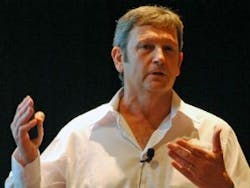“The Aria Assurance 360 agreement was a great visualization of our relationship.” Refining NZ’s strategy to build a high-performance culture includes pursuing the benefits of strategic alliances with key suppliers such as Honeywell.
Refining NZ is the only oil refinery in New Zealand, producing 130,000 barrels per day. Half of its production travels through a pipeline to Auckland, 90 miles away. Part of that is used to supply the jet fuel for aircraft at Auckland Airport.In September 2017, when the pipeline to the airport was split inadvertently by a digger, causing more than 100 flight cancellations and stranding thousands of passengers, the damage was contained and minimized, thanks largely to Refining NZ’s strategic partnership with Honeywell Process Solutions.
“It demonstrates the value of a strategic partnership in times of crisis,” said Peter Smit, head of process control at Refining NZ, who explained how his company has benefited from its Assurance 360 outcome-based, cooperative-service-agreement program in his presentation at Honeywell Users Group Americas 2018. “Thousands of people’s travels were affected because we couldn’t supply the airport with fuel. As soon as it happened, Honeywell understood the importance of it. We didn’t have to ask them to do something. They came and said, ‘How can we help?’ That was very encouraging. This incident happened less than a mile from a major river, and nothing got to the river.”
In operation for 57 years, 30 of them with a Honeywell distributed control system (DCS), Refining NZ’s relationship with the automation giant has seen changes over time. Following an initiative to develop and enhance the relationship, culminating in the signing of a relationship charter, Refining NZ committed even further with the Aria Assurance 360 program, which is a framework agreement with a five-year term and options to extend.
“One of the current strategies of Refining NZ is to embed a high-performance culture within its organization,” said Smit. “This includes pursuing the benefits of strategic alliances with key suppliers. Honeywell, as one strategic partner, was well positioned to provide significant value. The Aria Assurance 360 agreement was a great visualization of our relationship, and the charter was signed at the Honeywell Users Group Asia-Pacific in 2014.”
The three major components of the agreement focus on sustaining support, stable platform and innovation. The program required governance structures to align with relationship governance, which were already in place. A detailed 90-day transition plan was implemented to consolidate policies and procedures, finalize KPIs and conduct an initial cybersecurity vulnerability assessment.
The systems and applications included in the scope of the initial program were:
- Honeywell DCS (TDC 2000, TDC 3000 and Experion PKS),
- Operator training simulator (OTS),
- Advanced alarm management (AAM),
- Uniformance PHD,
- Profit Suite,
- Refining and Petrochemical Modeling System (RPMS), a linear-programming MES,
- Fail safe controller (FSC),
- Process control network infrastructure, level 2 to level 3.5.
Recently added to the program were OneWireless, DynAMo software, Control Performance Monitor and UniSim Tutor.
The Aria Assurance 360 program added detail to the three key areas of focus, as well. Sustaining support included managed service for the existing DCS plus Benefits Guardianship Program (BGP) for advanced solutions. The stable platform aspect of the program included the migration program for Experion consoles, including HTML displays, integration of safeguarding migration and migration for six of the refinery’s eight Data Hiway implementations. The innovation aspect of the agreement included a Honeywell global consulting study to identify opportunities and provide seed funding for initial projects.
On the plus side
Some additional benefits of the Aria program included reduced risk and “last-time-buy” Data Hiway spares. “We’ve been relieved of that risk by Honeywell,” said Smit. “That’s been going really well.”
Honeywell also set up a proactive maintenance program. “Since Honeywell took over the maintenance of the system, the average fault count has come down,” said Smit. “We’ve also gotten significant benefit in ramped-up cybersecurity. Honeywell completed a vulnerability assessment, and we embarked on a program of remediation.” Because the business-network-to-control-system firewall was identical to the outward-facing firewall, an issue with the DCS firewall identified by Honeywell and addressed was also present in the outward-facing firewall, so that was also fixed.
“We set up some focused webinars on subjects we were interested in—Profit Suite, PHD and Control Performance Monitor,” explained Smit. “We use PHD as a data collector for our PI system. We also removed waste and streamlined the commercial process. Whenever we needed Honeywell to do a piece of work in the past, we needed a proposal. Now we could cut a purchase order immediately. When we had a new project, we were able to get Honeywell involved early in the project with the design. We’ll also save a lot of money with our OneWireless infrastructure.”
New opportunities for innovation also mean increased revenue. “We’re benefiting about $2 million a year with continuous catalyst regeneration (CCR) advanced process control (APC) success. The DynAMo operations suite rollout has started, too.”
Honeywell also participated in Refining NZ’s annual Hive Days gathering, bringing in a wireless access point and demonstrating a virtual reality (VR) headset to the entire organization, including the CEO.
“Our first program finishes at the end of 2019, so we need to prepare for the next steps,” said Smit. “We recently completed another relationship survey. We identified a few things we need to work on. We need to identify what we need to do in our next program period. On the commercial side we really need to look at how well this program has done and learn from what has happened. We’d like to broaden that scope and include UOP.”
About the Author
Mike Bacidore
Mike Bacidore

Leaders relevant to this article:


